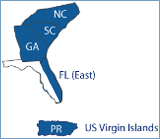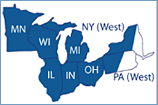You are here: Home
Center for Sponsored Coastal Ocean Research
The Center for Sponsored Coastal Ocean Research (CSCOR) uses a multi-disciplinary approach to understanding and predicting the impacts of natural and anthropogenic influences on coastal regional ecosystems (see map), communities, and economies. More
Newsflash:
- CSCOR-Supported Scientists Forecast a "Moderately Large" Red Tide for the Gulf of Maine this Spring and Summer
- New Understanding of Florida Red Tides Improves Management and Response
- CSCOR-Sponsored Study Named One of Nature's Top 15 Evolutionary Gems
Project of the Month:
Highlights
Funding Opportunities
FOR PI's
Reporting Requirements
Outputs and Management Outcomes
Feature Stories -
2009 Gulf of Maine Red Tide
CSCOR-supported
Research Provides Foundation for Effective Management of the 'Dead
Zone'
Stakeholder Involvement
CSCOR makes a concerted effort to draw in stakeholders to best
target supported research. Learn
more...
Accomplishments
CSCOR has had numerous accomplishments to date...CSCOR's current research projects emphasize these areas:
| Ecological Forecasting | Regional Ecosystem Research | Stressor Research | |||
|---|---|---|---|---|---|
| Ecological
Forecasting |
Regional Ecosystem Research | Climate Change | Harmful Algal Blooms (HABs) | Hypoxia & Nutrient Pollution | |
*See map below for more information.

Note: Specific regional efforts can be found by moving your mouse pointer over the desired region.
 Current
efforts are focused mainly on understanding and developing predictive
capabilities for harmful
algal blooms, hypoxia,
and climate
change. More
Current
efforts are focused mainly on understanding and developing predictive
capabilities for harmful
algal blooms, hypoxia,
and climate
change. More
 Current
efforts are focused mainly on understanding and developing predictive
capabilities for harmful
algal blooms and hypoxia.
Many of these efforts are large-scale and multi-disciplinary in
nature to reflect the complex
problems they address. More
Current
efforts are focused mainly on understanding and developing predictive
capabilities for harmful
algal blooms and hypoxia.
Many of these efforts are large-scale and multi-disciplinary in
nature to reflect the complex
problems they address. More
 Current
efforts are focused mainly on understanding and developing predictive
capabilities for coral
reef ecosystems and the ecological
impacts of sea level rise. More
Current
efforts are focused mainly on understanding and developing predictive
capabilities for coral
reef ecosystems and the ecological
impacts of sea level rise. More
 Current
efforts are focused mainly on understanding and developing predictive
capabilities for harmful
algal blooms and hypoxia. Many
of these efforts are large-scale and multi-disciplinary in
nature to reflect the complex problems they address. More
Current
efforts are focused mainly on understanding and developing predictive
capabilities for harmful
algal blooms and hypoxia. Many
of these efforts are large-scale and multi-disciplinary in
nature to reflect the complex problems they address. More
 Current
efforts are focused mainly on understanding and developing predictive
capabilities for harmful
algal blooms, hypoxia and climate
change. More
Current
efforts are focused mainly on understanding and developing predictive
capabilities for harmful
algal blooms, hypoxia and climate
change. More
 Current
efforts are focused mainly on understanding and developing predictive
capabilities for coral
reef ecosystems and the ecological impacts of harmful
algal blooms. climate
change. More
Current
efforts are focused mainly on understanding and developing predictive
capabilities for coral
reef ecosystems and the ecological impacts of harmful
algal blooms. climate
change. More
 Current
efforts are focused mainly on understanding and developing predictive
capabilities for harmful
algal blooms. More
Current
efforts are focused mainly on understanding and developing predictive
capabilities for harmful
algal blooms. More
 Current
efforts are focused mainly on understanding and developing predictive
capabilities for harmful
algal blooms, hypoxia and climate
change. More
Current
efforts are focused mainly on understanding and developing predictive
capabilities for harmful
algal blooms, hypoxia and climate
change. More
 Current
efforts are focused mainly on understanding and developing predictive
capabilities for harmful
algal blooms and climate
change. More
Current
efforts are focused mainly on understanding and developing predictive
capabilities for harmful
algal blooms and climate
change. More




